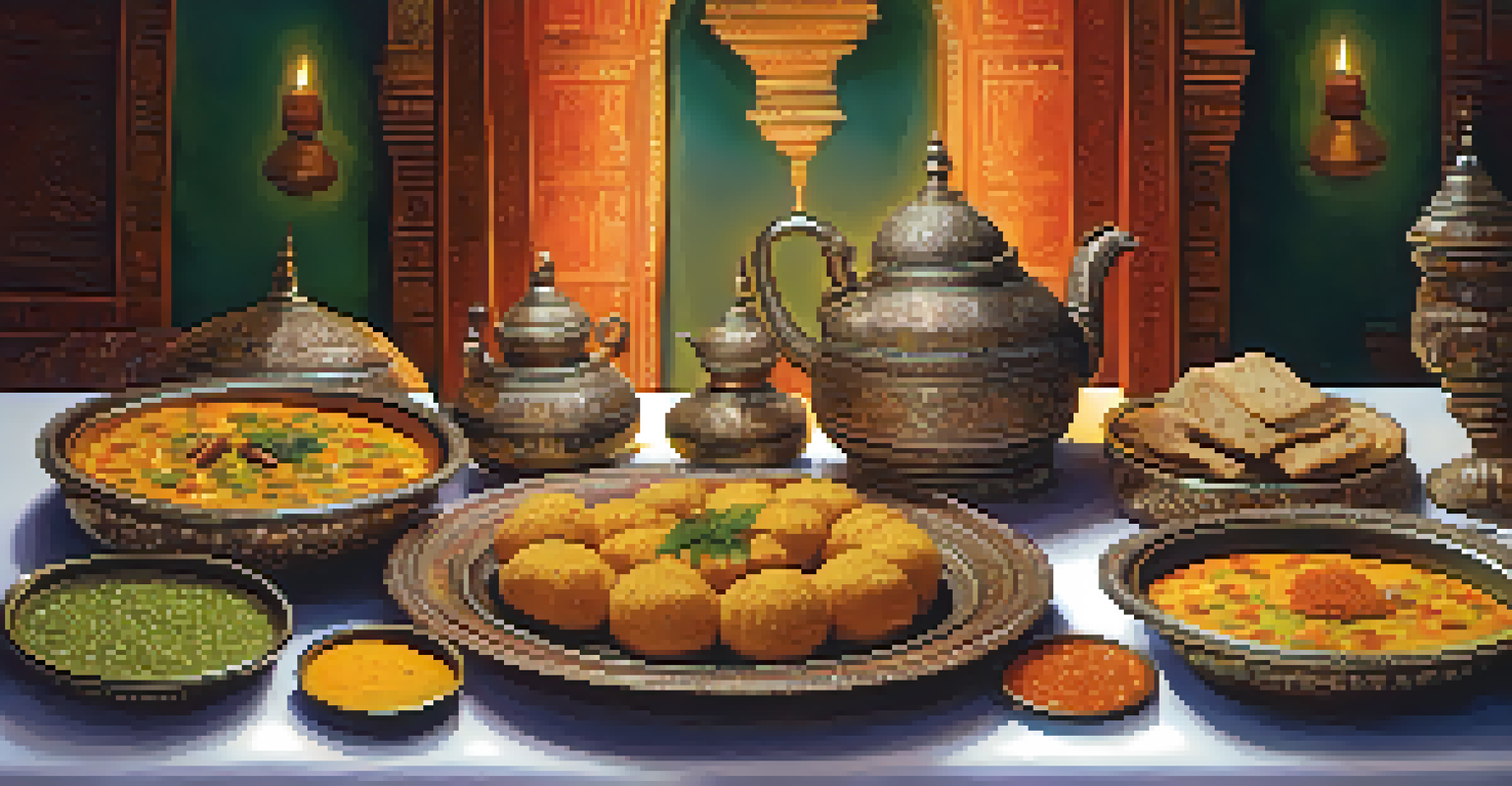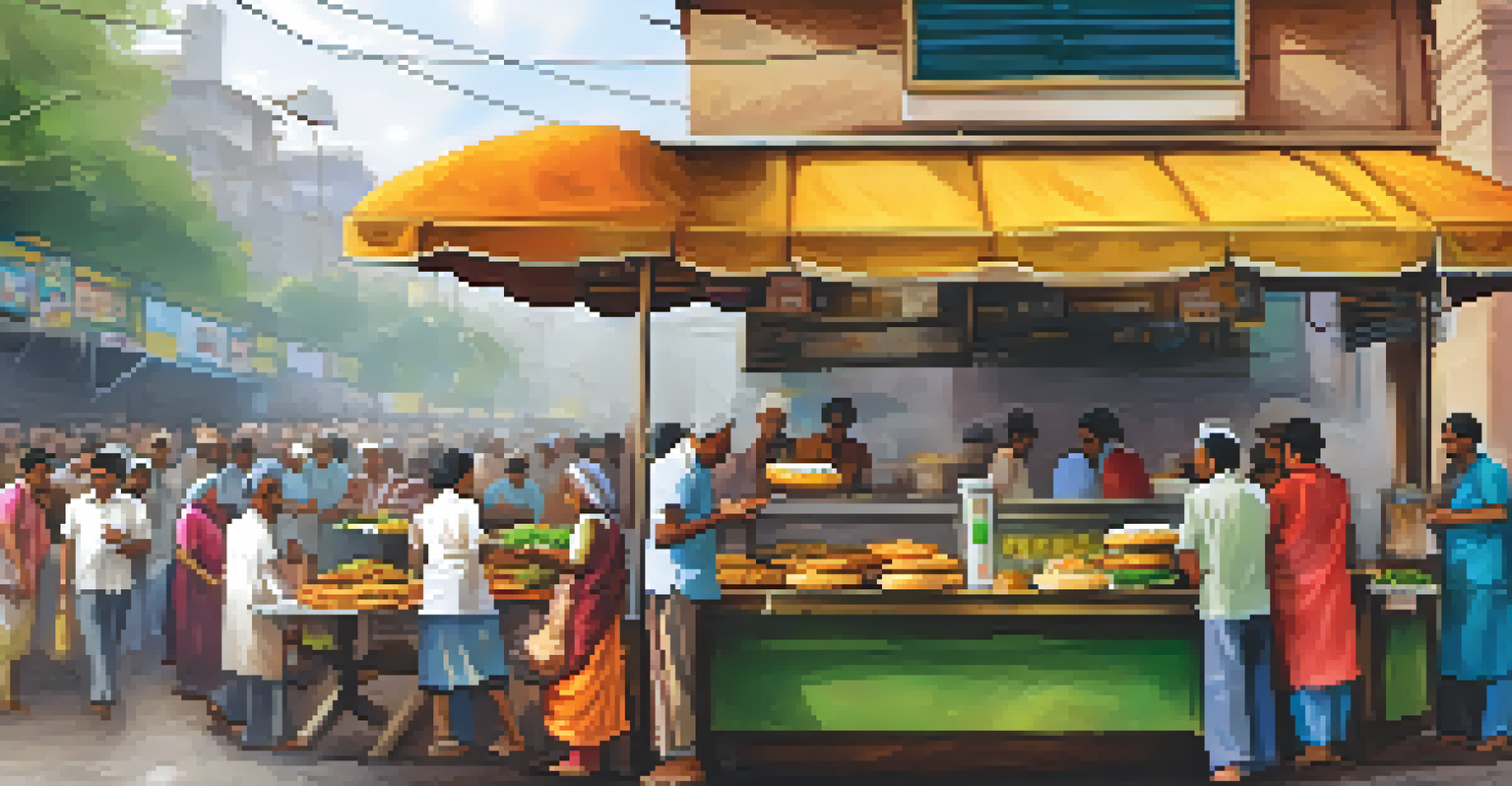Culinary Pilgrimages: Discovering India’s Food Heritage Sites

Understanding Culinary Pilgrimages and Their Significance
Culinary pilgrimages are more than just food trips; they are journeys into the heart of a culture. They allow travelers to connect deeply with local traditions, ingredients, and cooking methods that have been passed down through generations. In India, these culinary adventures offer a chance to taste history and experience the rich tapestry of regional cuisines.
Food is our common ground, a universal experience.
Food is often a reflection of a region's history, geography, and social fabric. By visiting food heritage sites, you’re not only sampling delicious dishes but also learning about the stories behind them. Each bite can tell a tale of migration, trade, or the fusion of cultures, making every meal a historical experience.
India's diverse culinary landscape is a mosaic of flavors, spices, and techniques. From the fiery curries of the south to the subtle flavors of the north, each region has its unique offerings that are worth exploring. Culinary pilgrimages are a way to celebrate this diversity while appreciating the artistry and passion involved in Indian cooking.
Exploring the Spice Market of Kochi
Kochi, known for its vibrant spice market, is a must-visit for any food lover. The aroma of spices fills the air, and the colorful stalls offer everything from cardamom to cinnamon. This bustling market not only provides a sensory overload but also shares insights into India's spice trade history, which dates back centuries.

As you wander through the market, you can engage with local vendors who are often eager to share their knowledge about the spices they sell. They might tell you about the best ways to use these spices in your cooking or share personal anecdotes about their families’ history in the spice trade. This interaction adds a personal touch to your culinary pilgrimage.
Culinary Journeys Reflect Culture
Culinary pilgrimages allow travelers to deeply connect with local traditions and the stories behind regional cuisines.
Visiting the spice market in Kochi is like stepping into a living history book. You can see firsthand how these spices were once transported along ancient trade routes and how they continue to be an integral part of Indian cuisine today. It's an experience that will deepen your appreciation for the flavors you encounter in your meals.
The Culinary Heritage of Rajasthan: A Royal Affair
Rajasthan is not just famous for its palaces and forts; it also boasts a rich culinary heritage that reflects its royal history. Traditional dishes like dal baati churma and gatte ki sabzi speak volumes about the region's vibrant flavors and cooking techniques. Each meal is an experience, often served with the grandeur reminiscent of royal feasts.
The discovery of a new dish does more for the happiness of mankind than the discovery of a new star.
Visitors can participate in cooking classes in Rajasthan, where local chefs share secrets of their culinary traditions. This hands-on experience allows you to learn how to prepare iconic dishes using authentic ingredients and methods. As you cook, you'll hear stories that provide context, making the process even more meaningful.
Exploring Rajasthan's food heritage is a journey through time, where you can savor age-old recipes in stunning settings. Whether dining in a traditional haveli or enjoying a meal in the desert, each experience is a celebration of the region's rich culture and history, making it a highlight of any culinary pilgrimage.
Street Food Adventures in Mumbai
Mumbai's street food scene is legendary, offering a thrilling culinary adventure for those willing to explore. From the iconic vada pav to the delectable pav bhaji, the city's bustling streets are alive with flavors that tell a story of its diverse population. Each vendor has their unique twist on classic dishes, making every bite a new experience.
As you navigate the lively streets, you'll encounter passionate food vendors eager to share their culinary creations. These interactions often lead to delightful surprises, like discovering the best chutneys or the perfect spice mix that elevates a dish. It’s a communal experience, where food brings people together, regardless of background.
Street Food: A Vibrant Experience
Exploring street food in cities like Mumbai immerses you in local culture and communal spirit through diverse flavors.
Street food in Mumbai is not just about the food; it's about the atmosphere. The sounds, sights, and smells create an unforgettable ambiance that adds to the overall experience. Sampling street food is a culinary pilgrimage that immerses you in the vibrant culture of the city, making it a highlight of your journey.
Savoring the Flavors of Kerala: A Coastal Delight
Kerala is often referred to as ‘God's Own Country,’ and its cuisine reflects this divine status. With an abundance of fresh seafood, coconuts, and spices, Kerala's culinary offerings are both diverse and delicious. Traditional dishes like fish curry and appam showcase the region's coastal influences and rich agricultural practices.
A visit to Kerala often includes experiences like houseboat dining on the backwaters or participating in a traditional sadya (feast). These meals are not just about food; they are communal celebrations that highlight the importance of hospitality in Keralan culture. Sharing meals in such settings creates lasting memories and connections.
In Kerala, food is also tied to festivals and rituals, adding another layer of depth to its culinary landscape. Understanding the significance of certain dishes during celebrations enhances your appreciation for the flavors and traditions. It’s a journey that goes beyond taste, delving into the heart of Keralan culture and heritage.
The Cultural Significance of Food in Punjab
Punjab's cuisine is a reflection of its agricultural abundance and rich cultural heritage. Dishes like butter chicken and sarson da saag are not just meals; they are symbols of the region's history and community spirit. Food in Punjab is often enjoyed in large gatherings, emphasizing the importance of togetherness.
When visiting Punjab, you can partake in traditional meals served in dhabas (roadside eateries), where the food is hearty and the atmosphere is inviting. These establishments often use recipes passed down through generations, ensuring authenticity in every dish. Dining here is an experience filled with warmth and hospitality.
Heritage Dishes Celebrate Community
Traditional meals in regions like Punjab and Rajasthan are not just about food, but also about togetherness and shared history.
The cultural significance of food in Punjab goes beyond just sustenance. It’s a way to celebrate life, express love, and build community. Engaging with local families during meal times can deepen your understanding of the region's values, making it a significant aspect of your culinary pilgrimage.
Tasting the Legacy of Bengali Cuisine
Bengali cuisine is known for its emphasis on fish, rice, and a variety of spices. Dishes like macher jhol (fish curry) and shorshe ilish (hilsa fish in mustard sauce) are not only delicious but also showcase the region's connection to the rivers and seas. Exploring Bengali food is like taking a deep dive into the culture and heritage of West Bengal.
In Kolkata, you can find a plethora of eateries serving traditional Bengali meals, often in a rustic setting. The experience of tasting these dishes while learning about their origins adds a rich layer to your culinary journey. Local chefs often share stories about their family recipes, connecting you to the region's history.

Bengali cuisine is also marked by its sweets, such as rasgulla and sandesh, which are integral to celebrations and festivals. Understanding the significance of these desserts adds another dimension to your culinary pilgrimage. Each meal in Bengal is a celebration of life, making it an unforgettable part of your journey through India's food heritage.
Conclusion: Embracing India's Culinary Heritage
Culinary pilgrimages through India offer a unique opportunity to embrace the country's rich food heritage. Each region, with its distinct flavors and traditions, invites travelers to explore and appreciate the stories behind every dish. This journey is not just about food; it's about connecting with the culture and people that make India so vibrant.
As you embark on these culinary adventures, you'll discover the importance of food in building community, preserving traditions, and celebrating life. Whether you're savoring street food in Mumbai or enjoying a royal meal in Rajasthan, each experience leaves a lasting impression that goes beyond taste.
In a world that often feels fast-paced and disconnected, culinary pilgrimages remind us to slow down and appreciate the richness of our cultural heritage. So, pack your bags, and get ready to explore and savor the incredible culinary landscape of India—one delicious bite at a time.